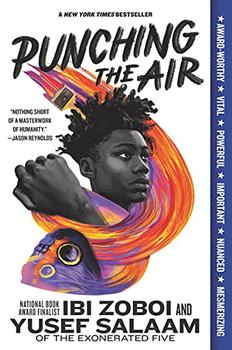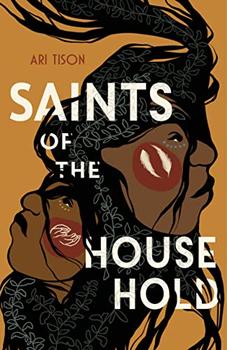Summary | Excerpt | Reading Guide | Reviews | Beyond the book | Read-Alikes | Genres & Themes | Author Bio

I paint in words and voices, rhymes and rhythm
and every whisper, every conversation beats a drum
in my mind
at full blast
...
I paint in wrong choices, regrets, and broken dreams
and every acquaintance, friend, and enemy laughs at me
in my mind
really, really loud
Sixteen-year-old Amal Shahid, a Black Muslim boy, is a promising artist who loves to paint and spit rhymes (rap). He attends an art magnet school and is looking forward to applying to colleges, until the night he is drawn into a fight that leaves a white boy in a coma and Amal with regrets and broken dreams.
Written in first-person verse by National Book Award finalist Ibi Zoboi (American Street) and Yusef Salaam, one of the "Central Park Five" (now the Exonerated Five; see Beyond the Book), Punching the Air takes on Big Issues — racism, the school-to-prison pipeline, prison abolition and gentrification — while still telling an affecting story of one specific boy whose life is shaped by structural and institutional forces beyond his control.
At trial, where "everything that I am, that I've ever been / counts as being / guilty," Amal, who admits "I threw the first punch but not the last," is found guilty of assault and battery and sent to juvenile detention. There, he struggles with rules "that force us into straight lines...like robots like worker ants" and with a racially segregated social order in which he has a target on his back. He begins to give in to despair and rage, having lost not just his freedom and future, but also his means of self-expression: "I sink deeper and deeper into hell...The mountain in my throat / the building on my chest / are now an entire country and city / in my stomach."
Through a poetry class led by a prison abolitionist, some kind gestures from a guard who encourages his art, and the support of his friends and family, Amal gradually makes his way back to the surface, even as he waits for the boy he supposedly assaulted to come out of his coma and tell the truth about what happened that night.
The book's messaging around systemic racism and structural violence can be heavy-handed, relying on clunky exposition and stock characters rather than trusting Amal and the reader to gradually awaken to a greater awareness of these issues through the story. For example, a guest speaker's lessons on the 13th Amendment feel like a didactic interruption, intended more to teach the reader than to move Amal's story forward.
The writing, however, can be captivating and powerful, especially when it lets the reader into Amal's interior life. Spare and straightforward verse gives way to vibrant, rhythmic bursts when he spits his rhymes. He is a wonderfully complex main character — neither sinner nor saint, sheltered yet aware, still a boy but not a child — and an important counter to the stereotypes of Black teenage boys that saturate the media.
As an undertold story, a primer on systemic racism and simply a work of literature, Punching the Air deserves a spot on the bookshelves — and book club lists — of both teen and adult readers.
![]() This review was originally published in The BookBrowse Review in October 2020, and has been updated for the
January 2022 edition.
Click here to go to this issue.
This review was originally published in The BookBrowse Review in October 2020, and has been updated for the
January 2022 edition.
Click here to go to this issue.

If you liked Punching the Air, try these:

by Ari Tison
Published 2025
Saints of the Household is a haunting contemporary YA about an act of violence in a small-town - beautifully told by a debut Indigenous Costa Rican-American writer - that will take your breath away.

by Louisa Onome
Published 2024
Fans of Netflix's On My Block and readers of Elizabeth Acevedo and Angie Thomas will love this debut novel about a girl whose life is turned upside down after one local act of vandalism throws both her relationships and neighborhood into turmoil.
More Anagrams
Click Here to find out who said this, as well as discovering other famous literary quotes!
Your guide toexceptional books
BookBrowse seeks out and recommends the best in contemporary fiction and nonfiction—books that not only engage and entertain but also deepen our understanding of ourselves and the world around us.